INTERNACIONAL
GOP holdouts unmoved by Trump’s ‘big, beautiful’ trip to Capitol Hill
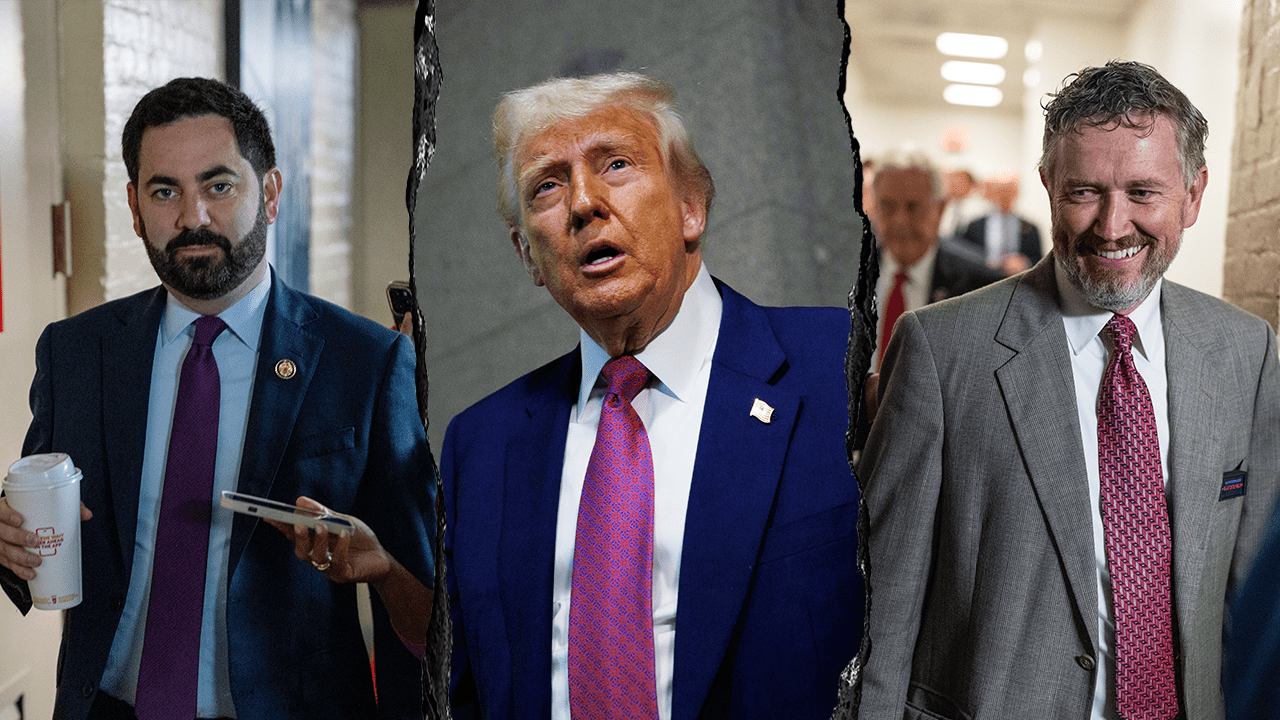
President Donald Trump’s rallying speech to House Republicans Tuesday morning wasn’t enough to convince some holdouts to unite behind his «big, beautiful bill» ahead of a planned vote this week.
Trump urged Republicans to cease infighting on Medicaid reform and state and local tax (SALT) deduction caps at the House GOP’s weekly conference meeting. Several Republicans who emerged said they were still concerned enough to oppose the bill, however.
House Freedom Caucus Chair Andy Harris, Rep. Eric Burlison of Missouri, Rep. Thomas Massie of Kentucky and representatives Nick LaLota, Mike Lawler and Andrew Garbino of New York told Fox News Digital Tuesday they would vote against the bill if changes were not made.
On the other hand, Trump did persuade some people. Rep. Ralph Norman of South Carolina, one of several Republicans to sink a committee vote on the bill Friday, told reporters he would review it and make a «judgment call» ahead of a 1 a.m. meeting to advance the bill through the House Rules Committee.
INSIDE TRUMP’S URGENT MEETING WITH HOUSE GOP TO PASS THE ‘BIG, BEAUTIFUL BILL’
Rep. Mike Lawler (left) and Rep. Thomas Massie (right) said President Donald Trump did not convince them Tuesday to vote for his «big, beautiful bill» in its current form. (Getty Images)
Norman said Trump did a «fantastic job» and delivered «one of the best speeches I’ve heard» at the House GOP meeting, and he urged his blue state colleagues to «take the words the president said to heart about SALT.»
CONSERVATIVE RIPS BLUE STATE REPUBLICAN’S PROPOSAL TO RAISE TAXES ON WEALTHY IN SALT DEBATE
Norman and Rep. Chip Roy, R-Texas, are both members of the powerful rules panel who have not been shy about their concerns with the current bill. The committee acts as the final gatekeeper before most legislation sees a full House vote.
Roy did not appear to attend Trump’s speech but told reporters Monday evening the 1 a.m. Wednesday vote should be postponed.
But the New York Republicans weren’t budging after Trump’s «big, beautiful» speech, maintaining the bill doesn’t go far enough to deliver for middle-class New Yorkers on the SALT deduction cap.
«This is the single biggest issue that I’ve talked about, and, with all due respect to the president, I’m not budging,» Lawler said.
«Between property taxes and income taxes, it blows well past the $30,000 cap with the $400,000 income cap. So, as I’ve said repeatedly, that is insufficient. We will continue the dialogue with leadership, but as it stands right now, I do not support the bill,» Lawler said.
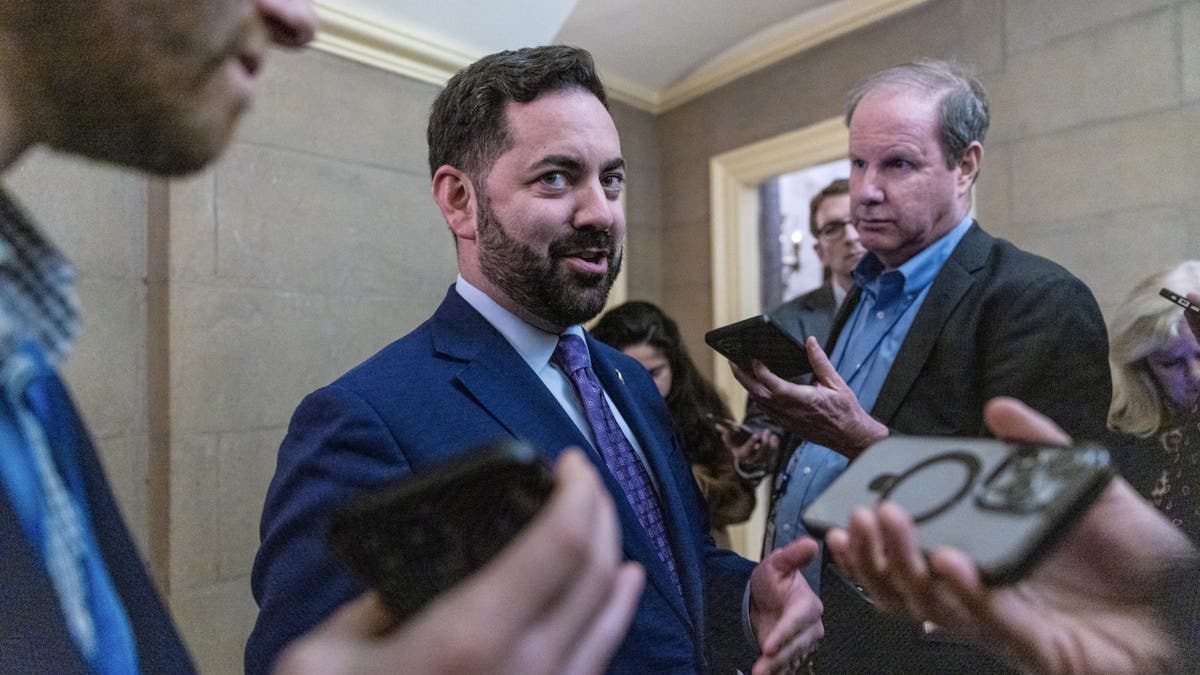
Rep. Mike Lawler, R-N.Y., speaks to reporters on Capitol Hill. (Reuters/Anna Rose Layden)
Lawler said SALT is one of the biggest issues affecting his district in New York and campaigned on never supporting a tax bill that doesn’t «adequately lift the cap.»
«The president can say whatever he wants, and I respect him, but the fact is, I certainly understand my district. I’m one of only three Republican members that won in a district Kamala Harris won, and I did so for reasons,» Lawler said.
«We need a little more SALT on the table to get to this,» fellow New York Republican LaLota added. «I hope the president’s presence motivates my leadership to give us a number that we can go sell back home.»
LaLota said while he is still a «no,» he hopes «the president’s presence here today motivates some folks in the Ways and Means Committee and my leadership to give us a number to which we can actually say ‘yes.’»
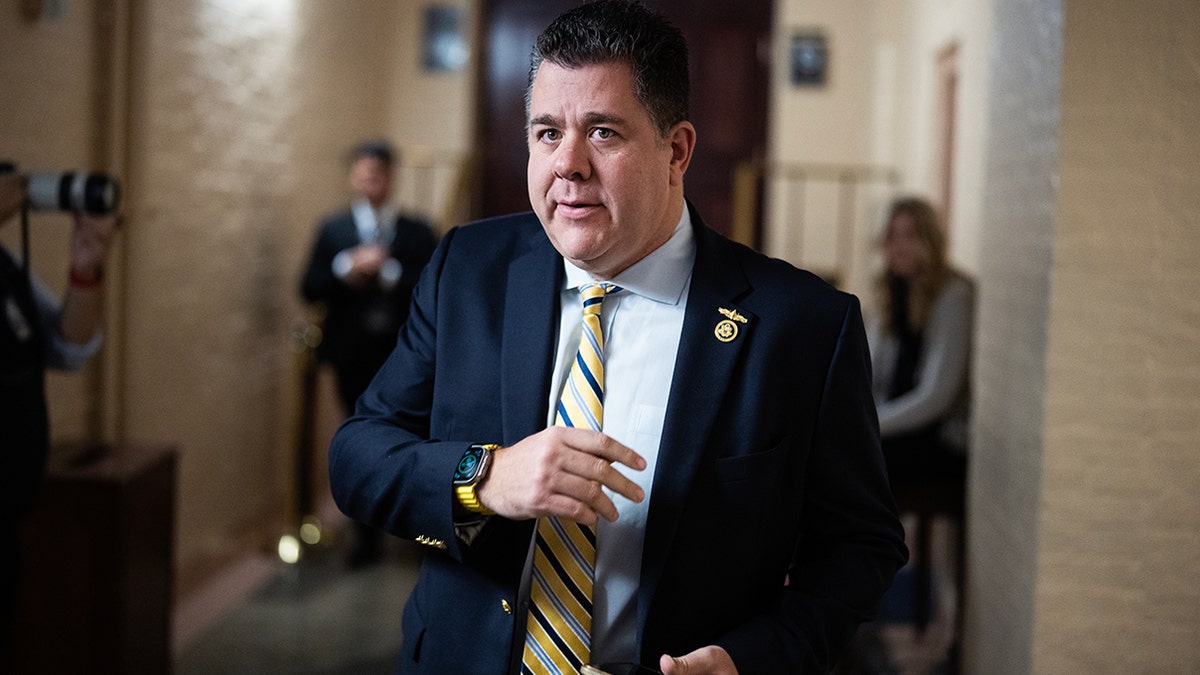
Rep. Nick Lalota, R-N.Y., leaves a meeting of the House Republican Conference. (Tom Williams/CQ-Roll Call, Inc via Getty Images)
When asked if Trump did enough to ease concerns in Tuesday’s meeting, Garbarino, another New York Republican, said, «No. There were no specifics. … It was more of a rally. We need to get this done.»
«We share President Trump’s call for unity within the House Republican Conference,» Rep. Young Kim, R-Calif., said in a joint statement after Trump’s visit to Capitol Hill.
«We hope his remarks today motivate the Speaker to advance a SALT proposal that delivers meaningful relief for our middle-class constituents, as we have worked in good faith with House Leadership for more than a year,» the statement from Kim, Garbarino, Lawler, LaLota and Rep. Tom Kean, R-N.J., said.
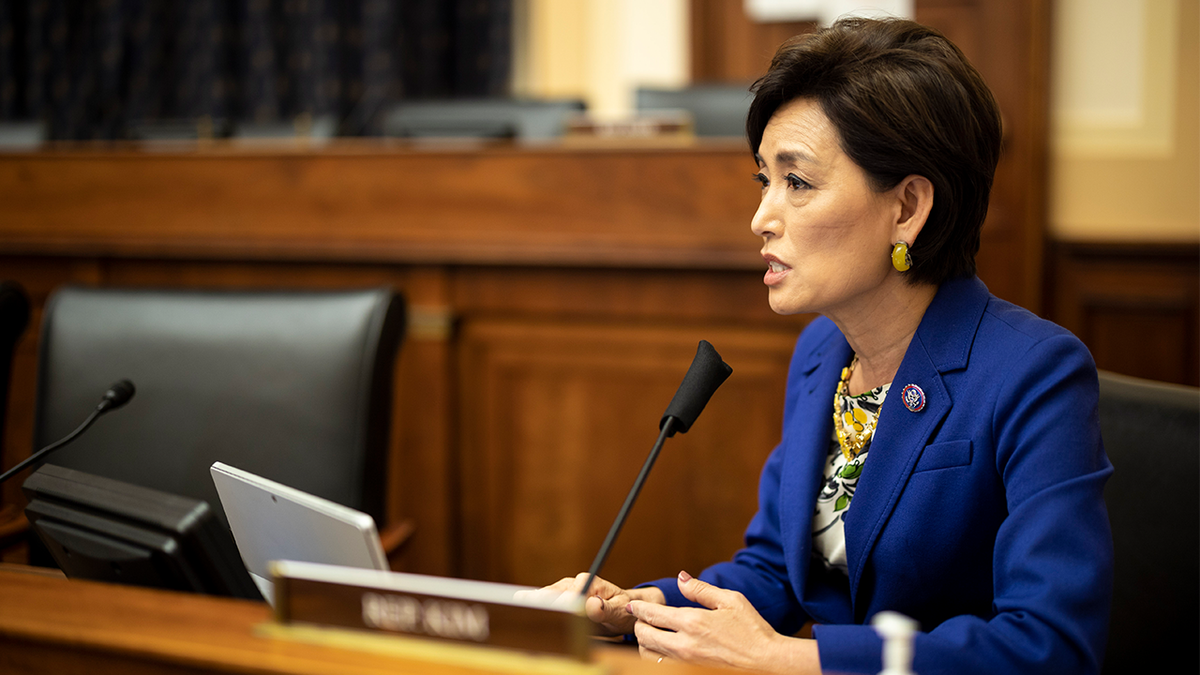
Rep. Young Kim, R-Calif., speaks during a hearing March 10, 2021, on Capitol Hill. (Ting Shen-Pool/Getty Images)
Meanwhile, Trump urged Republicans not to «f— with» Medicaid in his speech, though different factions came to different conclusions about what he meant.
Rep. Andy Ogles of Tennessee, who was not in the room for Trump’s speech, called for more cuts to the entitlement program in an X post Tuesday afternoon but told Fox News Digital he was opposed to the legislation as written.
«I agree with President Trump — we must crush the waste, fraud, and abuse. Liberal states like California and New York are abusing Medicaid — and making you pay for it. Illegal aliens and freeloaders have no right to taxpayer-funded benefits,» Ogles said on X.
Other fiscal conservatives, like Ogles, who were in the room, said the bill does not go far enough to reform Medicaid and would also vote «no» in the bill’s current form.
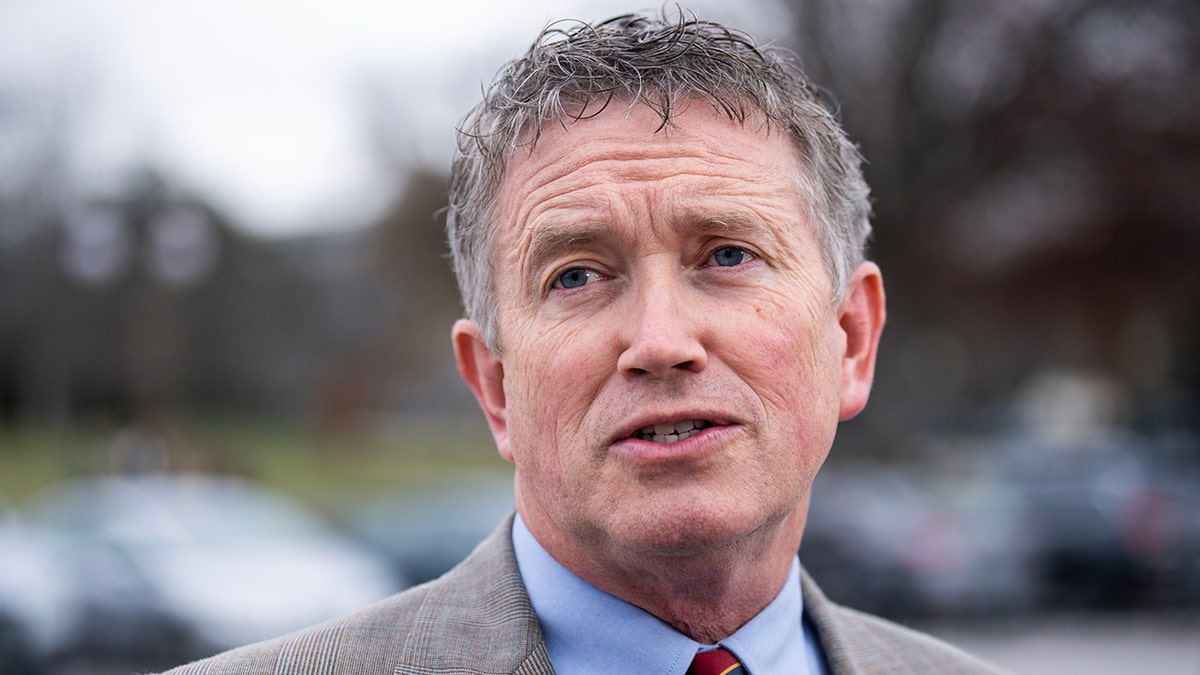
Rep. Thomas Massie, R-Ky., outside the Capitol building Dec. 18, 2024. (Tom Williams/CQ-Roll Call, Inc via Getty Images)
«I think it’s inappropriate for us to say we’re not going to touch it and then leave all of this fraud that’s happening in the system,» Burlison said.
Harris, the House Freedom Caucus chair, said, «I can’t support the bill. It does not eliminate waste, fraud and abuse in Medicaid. The president called for waste, fraud and abuse to be eliminated. I don’t think that’s where the bill sits.»
Massie, known for being a libertarian, was unconvinced by Trump’s appearance, telling reporters that his constituents didn’t «vote for increased deficits and Biden-level spending.»
He acknowledged that younger members or those who harbor ambitions for higher office would likely fall in line, however.
CLICK HERE TO GET THE FOX NEWS APP
«I think he probably closed the deal in there,» Massie said.
SALT deduction caps and Medicaid remain two of the biggest sticking points in Republican negotiations. SALT deduction caps primarily benefit people living in high-cost-of-living areas like New York City, Los Angeles and their surrounding suburbs. Republicans representing those areas have argued that raising the SALT deduction cap is a critical issue and that a failure to address it could cost the GOP the House majority in the 2026 midterms.
Republicans in redder, lower-tax areas have said in response that SALT deductions favor wealthy people living in Democrat-controlled states and that such deductions reward progressive high-tax policies.
It was Trump’s Tax Cuts and Jobs Act of 2017 that first instituted caps on SALT deductions, setting the maximum at $10,000 for both married couples and single filers.
SALT Caucus members have rejected House Republican leaders’ offer to increase that to $30,000.
Members of the conservative House Freedom Caucus, meanwhile, are pushing for the bill to be more aggressive in cutting waste, fraud and abuse in the Medicaid system, including a faster timeline for implementing work requirements for able-bodied recipients. Currently, the legislation has work requirements kicking in 2029.
They also want to restructure Medicaid cost-sharing to put a bigger burden on the states. Moderates, meanwhile, have been wary of making significant cuts to the program.
House GOP leaders are hoping to hold a full House vote on the bill this week.
Politics,House Of Representatives,Republicans,Donald Trump
INTERNACIONAL
El jefe de la OTAN respaldó la capacidad de respuesta del bloque frente a las incursiones de drones rusos en territorio aliado

El secretario general de la OTAN, Mark Rutte, destacó este jueves la rápida respuesta aérea del bloque frente a las recientes incursiones de drones y aviones rusos en el espacio aéreo de la Alianza.
Durante su visita al Mando Conjunto Aliado de la Fuerza de Brunssum, en los Países Bajos, Rutte subrayó que la organización está plenamente preparada para reaccionar ante cualquier amenaza en el norte y el este de Europa.
También remarcó la importancia estratégica de ese centro como pieza clave en la coordinación de las operaciones defensivas de la OTAN, en un contexto de creciente actividad militar rusa orientada a poner a prueba los límites de las defensas occidentales.
Rutte describió el flanco norte y oriental de Europa como escenarios donde Moscú evalúa la determinación de la Alianza y busca detectar debilidades en la coordinación defensiva.
“Estas son zonas donde Rusia intenta constantemente poner a prueba nuestra determinación y nuestras respuestas”, señaló el ex primer ministro neerlandés.
“La OTAN ha respondido de manera rápida y decisiva a las violaciones del espacio aéreo por parte de Rusia, y cada día nuestra sólida presencia sobre el terreno demuestra nuestra determinación”, agregó Rutte tras una reciente oleada de incidentes en territorio aliado.
El dirigente de la OTAN manifestó que la labor de Brunssum, uno de los tres mandos estratégicos en Europa, resulta fundamental para sostener la credibilidad disuasiva del bloque atlántico. Rutte argumentó que el despliegue de fuerzas multinacionales en ocho países del flanco oriental funciona como mensaje inequívoco hacia Rusia y otros adversarios.
“Las fuerzas en el flanco oriental, con los batallones multinacionales en ocho países aliados, envían una señal clara a cualquier adversario de que la OTAN se toma en serio su misión de protegerse mutuamente”, afirmó.
En incidentes anteriores, la OTAN optó por escoltar o interceptar aeronaves rusas y evitar acciones que pudieran convertirse en una escalada, aunque Rutte subrayó que la Alianza cuenta con todos los recursos y la voluntad política para defender su territorio y el aire aliado en caso de una agresión intencionada.
“Si Rusia intenta algo intencionalmente contra la OTAN, tenemos todas las herramientas para defender nuestro territorio y espacio aéreo”, puntualizó.
El secretario general defendió el compromiso asumido por los aliados para reforzar el gasto en defensa, camino al objetivo de destinar un 5% del PIB para 2035.
El acuerdo alcanzado meses atrás en la cumbre de La Haya refleja la evolución que el entorno internacional exige a la organización. Para la OTAN, el fortalecimiento defensivo no solo responde a la amenaza rusa sino también a la transformación acelerada de la guerra, impulsada por nuevas tecnologías y el aumento de ataques híbridos.
Rutte también aplaudió el avance de la coalición gubernamental sobre la reforma del servicio militar de Alemania.
Berlín adoptó una nueva fórmula que exigirá a partir del próximo año a jóvenes de 18 años —hombres obligatoriamente y mujeres de manera voluntaria— que informen su aptitud para el ejército, una medida calibrada para responder al déficit de personal en las fuerzas armadas.
Si el reclutamiento voluntario resulta insuficiente, la ley contempla la reintroducción de la obligatoriedad. El Ministerio de Defensa de Alemania proyecta incrementar su plantilla a 270.000 efectivos antes de 2035, frente a los cerca de 183.000 actuales.
Para el secretario general de la Alianza, la decisión alemana refuerza la capacidad colectiva de defensa.
“Cada país decide por sí mismo cómo encontrar suficientes hombres y mujeres para el ejército. Estoy muy feliz de escuchar que la coalición en Alemania ha acordado avanzar. Es muy importante”, evaluó Rutte.
El líder de la OTAN sostuvo que cualquier medida que implique mayor participación nacional en el esfuerzo militar constituye una contribución directa a la solidez conjunta de la Alianza, en tiempos de renovada rivalidad estratégica.
La agenda del bloque contempla, además, la entrega coordinada de materiales y equipamiento avanzado a Ucrania, en el marco de la invasión rusa y con financiación compartida entre Estados Unidos, la Unión Europea y el conjunto de los aliados.
(Con información de Europa Press y EFE)
International,Relations,Diplomacy / Foreign Policy,Europe
INTERNACIONAL
Progressive Democrats turn on party leadership after government shutdown ends without healthcare guarantees

NEWYou can now listen to Fox News articles!
Several Democrats broke ranks with their party to end the longest government shutdown in U.S. history in a move that has triggered backlash from rising progressive stars, including Rep. Alexandria Ocasio-Cortez, D-N.Y., who questioned whether the 43-day standoff had been worth it.
The intraparty revolt has exposed a widening rift between Democratic leadership and its left flank, as progressive candidates accused Senate Minority Leader Chuck Schumer, D-N.Y., of surrendering leverage to Republicans and President Donald Trump in exchange for a funding deal that left key healthcare priorities unresolved.
«We have federal workers across the country that have been missing paychecks. We have SNAP recipients, millions of SNAP recipients across the country whose access to food stability was imperiled, and we have to figure out what that was for,» Ocasio-Cortez said, before adding, «We cannot enable this kind of cruelty with our cowardice.»
Back on the campaign trail, several Democrats running in next year’s midterm elections blasted colleagues who voted to reopen the government without extending the pandemic-era Obamacare subsidies — the key provision they’ve pushed for since the shutdown began on Oct. 1.
GOVERNMENT SHUTDOWN 101: WE’VE BEEN HERE BEFORE, HERE’S WHAT HAPPENS NEXT
Rep. Alexandria Ocasio-Cortez, D-N.Y., talks with reporters outside the U.S. Capitol about members security after the murder of Charlie Kirk on Thursday, Sept. 11, 2025. (Tom Williams/CQ-Roll Call, Inc via Getty Images)
Aftyn Behn, the Democratic nominee to represent Tennessee’s 7th Congressional District who has been described as the «AOC of TN,» said the shutdown ending proved «we need a new generation of leadership in Washington» and criticized the «career politicians» who caved without a guarantee to vote on ACA subsidies from House Speaker Mike Johnson, R-La.
SCHUMER PUSHES SHUTDOWN INTO RECORD BOOKS AFTER REJECTING GOP BILL A 14TH TIME
Saikat Chakrabarti, Ocasio-Cortez’s former chief of staff who is running to replace House Speaker Emerita Nancy Pelosi in her congressional district in San Francisco, agreed those Democrats who «caved» to Trump to reopen the government proved «we need a new generation of leaders in Congress.»
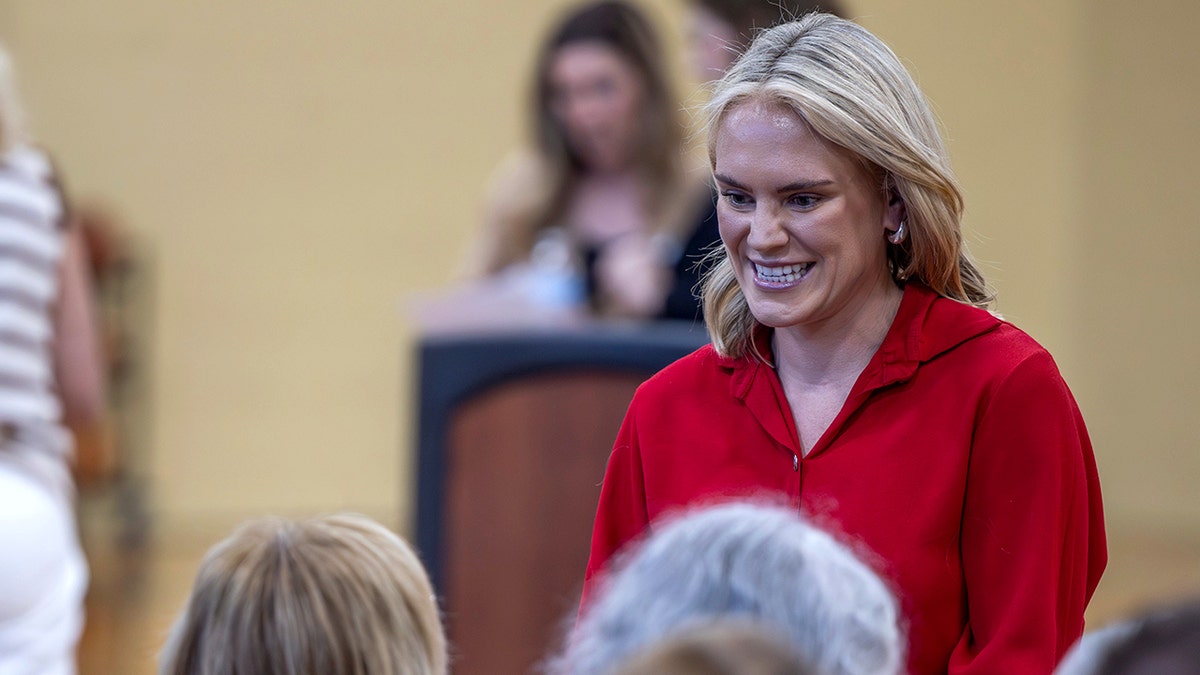
Tennessee state Rep. Aftyn Behn speaks to members of the audience before the start of a Democratic Party forum for candidates running for the 7th Congressional District special election at the Fairview Recreation Center in Fairview on Sunday, Sept. 7, 2025. (Alan Poizner-For The Tennessean/USA Today Network via Imagn Images)
«After 40 days of holding firm, with public opinion and momentum on our side, establishment Democrats decided to cave to Trump. Schumer and the entire democratic leadership need to step down — and if they run for re-election, we need to primary them,» Chakrabarti said.
THE 5 LONGEST GOVERNMENT SHUTDOWNS IN HISTORY: WHAT HAPPENED, HOW THEY ENDED
Dr. Abdul El-Sayed, one of several progressive candidates vying for Michigan’s open U.S. Senate seat next year, who «literally wrote the book on Medicare for All,» according to his campaign website,» said the healthcare fight shouldn’t end with ACA subsidies.
«It HAS TO BE bigger. Too many Americans are suffering over medical debt and spiraling costs. It should be nothing short of Medicare for All,» he said.
El-Sayed said Americans should be «spitting mad about a few Senate Dems capitulating as health insurance premiums skyrocket for 25M people.»
As word circulated Sunday night that Congress was approaching a deal to reopen the government, New York City Mayor-elect Zohran Mamdani called on Democrats to reject the bill.
«This ‘deal’ dramatically hikes healthcare premiums and only exacerbates the affordability crisis,» Mamdani said. «It should be rejected, as should any politics willing to compromise on the basic needs of working people.»
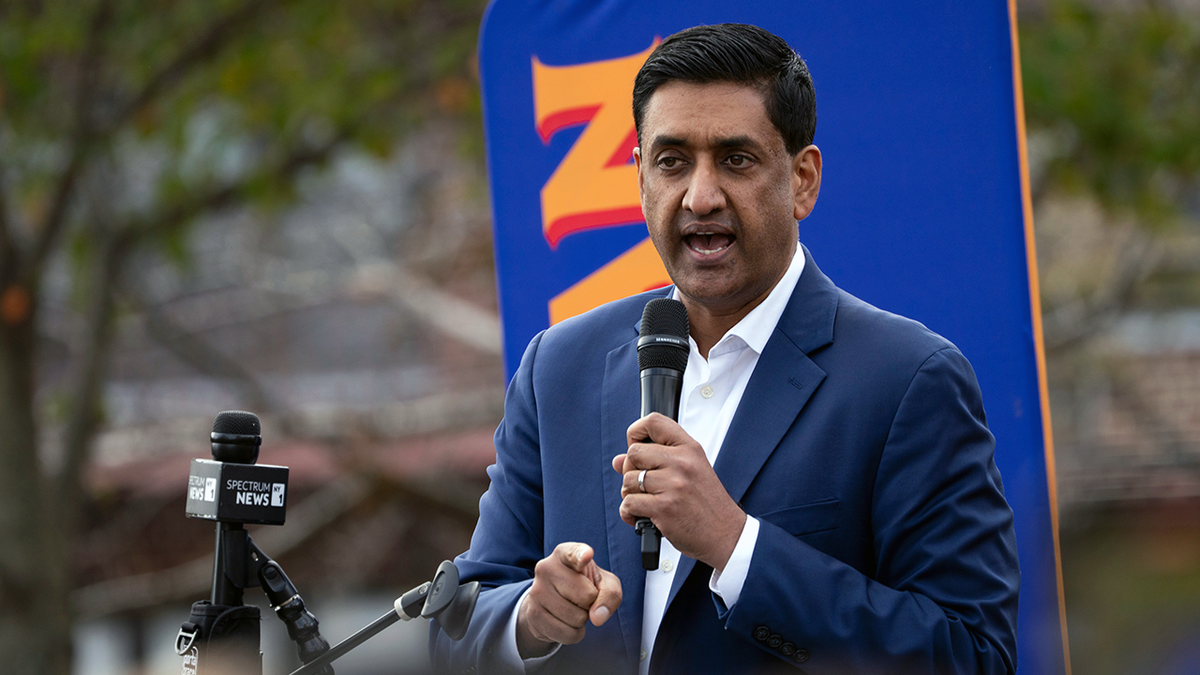
Rep. Ro Khanna, D-Calif., speaks at a campaign event for Zohran Mamdani in New York City on Saturday, Nov. 1, 2025. New York voters are turning out early in high numbers for a mayoral race that’s captured the country’s attention. (Christian Monterrosa/Bloomberg via Getty Images)
And Rep. Ro Khanna, D-Calif., who traveled to Queens, New York City, to campaign for Mamdani last month, has said this week that reopening the government without healthcare guarantees proved Schumer is «no longer effective and should be replaced.»
«If you can’t lead the fight to stop healthcare premiums from skyrocketing for Americans, what will you fight for?» Khanna said.
House Minority Leader Hakeem Jeffries, D-N.Y., on Thursday shifted the blame to Republicans, charging Trump and Republicans of adopting a «my way or the highway» approach in Congress.
«Unless they change course, we’re going to have challenges governmentally for the balance of the first two years of Donald Trump’s time in office,» Jeffries said on MSNBC’s «Way Too Early.»
Funding for the Supplemental Nutrition Assistance Program (SNAP) expired on Nov. 1, jeopardizing food access for millions of low-income Americans who rely on the benefit.

Sen. Bernie Sanders, I-Vt., speaks at the «No Kings» Rally in Washington, D.C., on Oct. 18, 2025. (Fox News Digital/Emma Woodhead)
While Ocasio-Cortez questioned what the shutdown was for, if not to preserve the healthcare subsidies, Rep. Shomari Figures, D-Ala., argued Wednesday that healthcare in Alabama is more than just a «talking point,» citing Alabama’s low life expectancy rates and limited hospitals.
«Protecting health care for us is a requisite,» he said. «It’s a requirement. It’s something we have to do. And if you ask us if the shutdown was worth it, I say, hell yes, it was worth it. Because fighting to maintain healthcare for American people, there’s nothing more pure than that. There’s no more important role that we have here as members of Congress.»
Meanwhile, «Squad» member Rep. Ilhan Omar, D-Minn., called the Senate’s deal a «betrayal of working people and a sham.»
«The public rightly recognizes that Trump and Congressional Republicans are to blame for the longest government shutdown in history,» Omar said in a statement on behalf of the progressive caucus.
CLICK HERE TO DOWNLOAD THE FOX NEWS APP
And Sen. Bernie Sanders, I-Vt., a longtime supporter of Medicare for All and universal healthcare, also criticized Trump on Wednesday for being «willing to see children go hungry to make a political point.»
«I think what is so important for folks to understand is that this problem is bigger than one person, and it actually is bigger than the minority leader in the Senate,» Ocasio-Cortez said Wednesday, calling this failure of Democrats to hold the line on the government shutdown a «reflection of the party.»
Fox News’ Tyler Olson and Ryan Schmelz contributed to this report.
democratic party,the squad,socialism,elections,midterm elections,government shutdown
INTERNACIONAL
Top Ukrainian officials in Zelenskyy government submit resignations amid $100 million corruption scandal

NEWYou can now listen to Fox News articles!
Two senior Ukrainian officials submitted their resignations Wednesday amid the fallout over an alleged $100 million kickback corruption scheme linked to the state-owned nuclear power company Energoatom.
Prime Minister Yuliia Svyrydenko said on X that Justice Minister Herman Halushchenko and Energy Minister Svitlana Grynchuk submitted their resignations, and the government suspended several senior officials at Energoatom amid the corruption probe.
Svyrydenko added that the cabinet also submitted proposals to apply personal sanctions against Timur Mindich, a former business partner of Ukrainian President Volodymyr Zelenskyy, and businessman Alexander Tsukerman.
Justice Minister Herman Halushchenko and Energy Minister Svitlana Grynchuk submitted their resignations on Nov. 12, 2025. (Thierry Monasse/Getty Images; Andrii Nesterenko/Global Images Ukraine via Getty Images)
Ukraine’s independent anti-corruption agencies, the National Anti-Corruption Bureau (NABU) and the Specialized Anti-Corruption Prosecutor’s Office (SAPO) said they led a 15-month investigation code-named «Midas» that uncovered a «large-scale corruption scheme to influence strategic state-owned enterprises.»
WITKOFF MEETS UKRAINE OFFICIALS IN NEW YORK AHEAD OF EMERGENCY UN SECURITY COUNCIL MEETING: ‘VERY PRODUCTIVE’
It involved a «high level criminal [organization]» that systematically received «illicit benefits from Energoatom’s contractors in the amount of 10% to 15% of the contract value,» NABU said.
«In particular, Energoatom’s contractors were forced to pay kickbacks to avoid having payments for their services/products blocked or losing their supplier status,» the agencies announced.
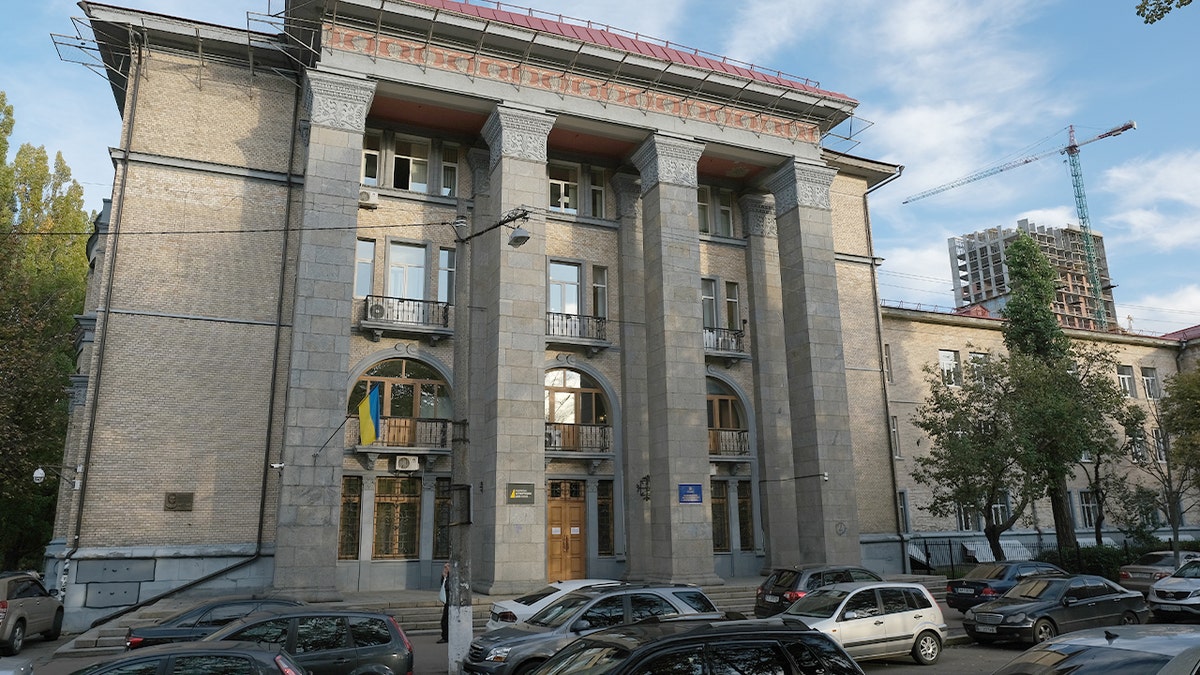
The offices of NABU, the National Anti-Corruption Bureau of Ukraine, on Oct. 1, 2019, in Kyiv, Ukraine. (Sean Gallup/Getty)
The anti-corruption agencies stated that the alleged criminal organization ran a Kyiv-based «laundry» office whose premises belonged to the family of former Ukrainian lawmaker and current Russian senator Andrii Derkach.
ZELENSKYY: UKRAINE ‘CONFIDENTLY MOVING TOWARD’ EU MEMBERSHIP AFTER EUROPEAN COMMISSION PROGRESS REPORT
The office kept «black accounting» records and laundered approximately $100 million through non-resident companies, according to NABU and SAPO.
Five people were detained and another seven were placed under suspicion, including a former advisor to the Minister of Energy.
The scandal comes amid Russia’s escalating attacks on Ukraine’s energy infrastructure that have led to power outages across the country.
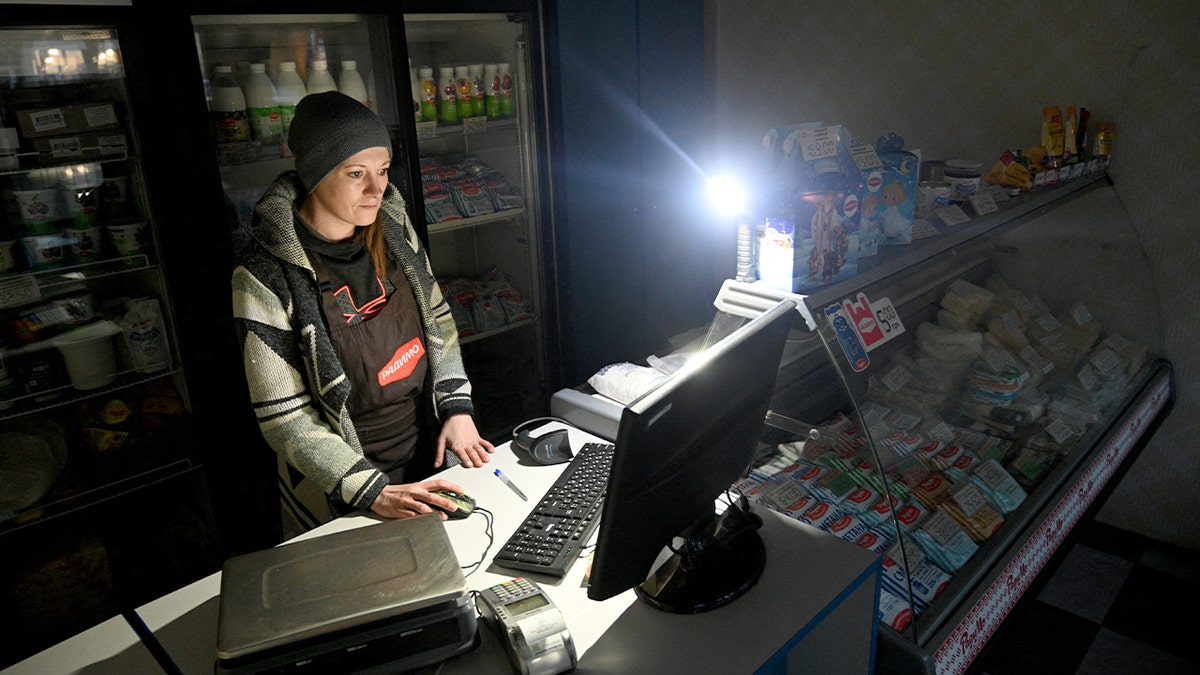
A seller waits for customers in a shop during a partial blackout in Lviv on Nov. 28, 2024, following Russian strikes on Ukrainian energy infrastructure amid the Russian invasion of Ukraine. (Yuriy Dyachyshyn/AFP via Getty Images)
3 CHINESE NATIONALS ARRESTED IN GEORGIA FOR TRYING TO BUY $400K WORTH OF BLACK-MARKET URANIUM
«Internally this scandal will be used to undermine unity and stability within the country. Externally, our enemies will use it as an argument to stop aid to Ukraine,» said Oleksandr Merezhko, a lawmaker with Zelenskyy’s party, according to The Associated Press.
«It looks really bad in the eyes of our European and American partners,» Merezhko said. «While Russians destroy our power grid and people have to endure blackouts, someone at the top was stealing money during the war.»
Zelenskyy said in a post on X that he supports the investigations carried out by Ukraine’s law enforcement and anti-corruption officials.

President of Ukraine Volodymyr Zelenskyy participates in a briefing at the Office of the President following a staff meeting in Kyiv, Ukraine, on Nov. 7, 2025.
CLICK HERE TO DOWNLOAD THE FOX NEWS APP
«Right now it is extremely difficult for everyone in Ukraine – enduring power outages, Russian strikes, and losses. It is absolutely unacceptable that, amid all this, there are also some schemes in the energy sector,» he wrote. «I will sign a decree to impose sanctions on two individuals implicated in the NABU case concerning Energoatom. Right now we all must protect Ukraine. Undermining the state means you will be held accountable. Breaking the law means you will be held accountable.»
ukraine,corruption,world,energy

 CHIMENTOS2 días ago
CHIMENTOS2 días agoWada Nara se despidió de sus hijas con un desgarrador mensaje al entregárselas a Mauro Icardi: «Que la pasen hermoso»

 POLITICA2 días ago
POLITICA2 días agoAxel Kicillof prometió no subir impuestos, pero montó un mecanismo de recaudación con Ingresos Brutos

 ECONOMIA1 día ago
ECONOMIA1 día agoGuiño al crédito fintech: el BCRA autorizará el débito directo de cuotas, prohibido durante el Gobierno anterior

























